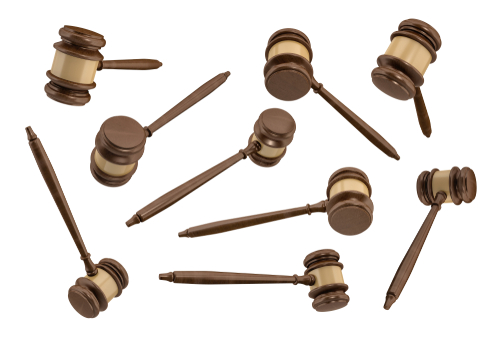Which judges are most likely to issue nationwide injunctions? Party of appointing president makes a difference

Fifty-nine out of the 64 nationwide injunctions blocking Trump administration policies were issued by judges appointed by Democratic presidents, according to a study in the Harvard Law Review. (Image from Shutterstock)
Fifty-nine out of the 64 nationwide injunctions blocking Trump administration policies were issued by judges appointed by Democratic presidents, according to a study in the Harvard Law Review.
All 14 nationwide injunctions blocking Biden administration policies through 2023, on the other hand, have been issued by Republican-appointed presidents.
Nationwide injunctions “are overwhelmingly issued by judges appointed by a president from the opposite political party as the president who promulgated the policy at issue,” study authors and students Layla Rao and Laura Aguilar concluded in their article.
Reuters and CBS News covered the study, published Wednesday, while the Volokh Conspiracy had highlights.
Often, the policies being enjoined nationwide relate to hot-button issues, such as immigration and the COVID-19 pandemic, the study said.
“The increase in nationwide injunctions on highly politicized issues fuels the public’s perception that the courts themselves are politicized and that federal judges are political actors,” Rao and Aguilar wrote.
Rao and Aguilar relied on information obtained from the U.S. Department of Justice in a public records request. They supplemented that data with searches on Westlaw and LexisNexis. Their study is part of a Harvard Law Review issue addressing court reform written by students, according to Reuters.
The study found that nationwide injunctions are becoming more common. Judges issued only two nationwide injunctions from 1963 to 1982. After that, judges issued a dozen or less nationwide injunctions in each presidential administration until Donald Trump became president.
Although there appears to be a decrease in nationwide injunctions issued during the Biden administration, Rao and Aguilar noted that some judges are turning to vacatur, rather than injunctions, to curb executive action.
Federal courts most often issuing nationwide injunctions blocking Trump administration policies were in the Northern District of California, the District of Columbia and the District of Maryland. The federal courts that most often blocked Biden administration policies were in Texas.
Nicholas Bagley, a professor at the University of Michigan Law School, told CBS News that litigants seeking to block federal policies try to file their cases in a court likely to favor their viewpoint.
When presidents implement policies through executive action, “there’s a ripe opportunity for a lawsuit,” Bagley said. “And if you’re bringing one of these lawsuits, you’re going to do your damndest to bring it in front of a friendly forum.”
The voting patterns revealed in the students’ study “cannot help but call the judiciary into disrepute,” Bagley said. “It doesn’t look like they’re applying the law in a clear way. It will erode the judiciary’s legitimacy, no question about it.”



